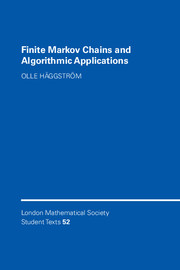Book contents
- Frontmatter
- Contents
- Preface
- 1 Basics of probability theory
- 2 Markov chains
- 3 Computer simulation of Markov chains
- 4 Irreducible and aperiodic Markov chains
- 5 Stationary distributions
- 6 Reversible Markov chains
- 7 Markov chain Monte Carlo
- 8 Fast convergence of MCMC algorithms
- 9 Approximate counting
- 10 The Propp–Wilson algorithm
- 11 Sandwiching
- 12 Propp–Wilson with read-once randomness
- 13 Simulated annealing
- 14 Further reading
- References
- Index
10 - The Propp–Wilson algorithm
Published online by Cambridge University Press: 29 March 2010
- Frontmatter
- Contents
- Preface
- 1 Basics of probability theory
- 2 Markov chains
- 3 Computer simulation of Markov chains
- 4 Irreducible and aperiodic Markov chains
- 5 Stationary distributions
- 6 Reversible Markov chains
- 7 Markov chain Monte Carlo
- 8 Fast convergence of MCMC algorithms
- 9 Approximate counting
- 10 The Propp–Wilson algorithm
- 11 Sandwiching
- 12 Propp–Wilson with read-once randomness
- 13 Simulated annealing
- 14 Further reading
- References
- Index
Summary
Recall, from the beginning of Chapter 8, the problems (A) and (B) with the MCMC method. In that chapter, we saw one approach to solving these problems, namely to prove that an MCMC chain converges sufficiently quickly to its equilibrium distribution.
In the early 1990's, some ideas about a radically different approach began to emerge. The breakthrough came in a 1996 paper by Jim Propp and David Wilson [PW], both working at MIT at that time, who presented a refinement of the MCMC method, yielding an algorithm which simultaneously solves problems (A) and (B) above, by
(A*) producing an output whose distribution is exactly the equilibrium distribution π, and
(B*) determining automatically when to stop, thus removing the need to compute any Markov chain convergence rates beforehand.
This algorithm has become known as the Propp–Wilson algorithm, and is the main topic of this chapter. The main feature distinguishing the Propp–Wilson algorithm from ordinary MCMC algorithms is that it involves running not only one Markov chain, but several copies of it, with different initial values. Another feature which is important (we shall soon see why) is that the chains are not run from time 0 and onwards, but rather from some time in the (possibly distant) past, and up to time 0.
Due to property (A*) above, the Propp–Wilson algorithm is sometimes said to be an exact, or perfect simulation algorithm.
We go on with a more specific description of the algorithm.
Information
- Type
- Chapter
- Information
- Finite Markov Chains and Algorithmic Applications , pp. 76 - 83Publisher: Cambridge University PressPrint publication year: 2002
